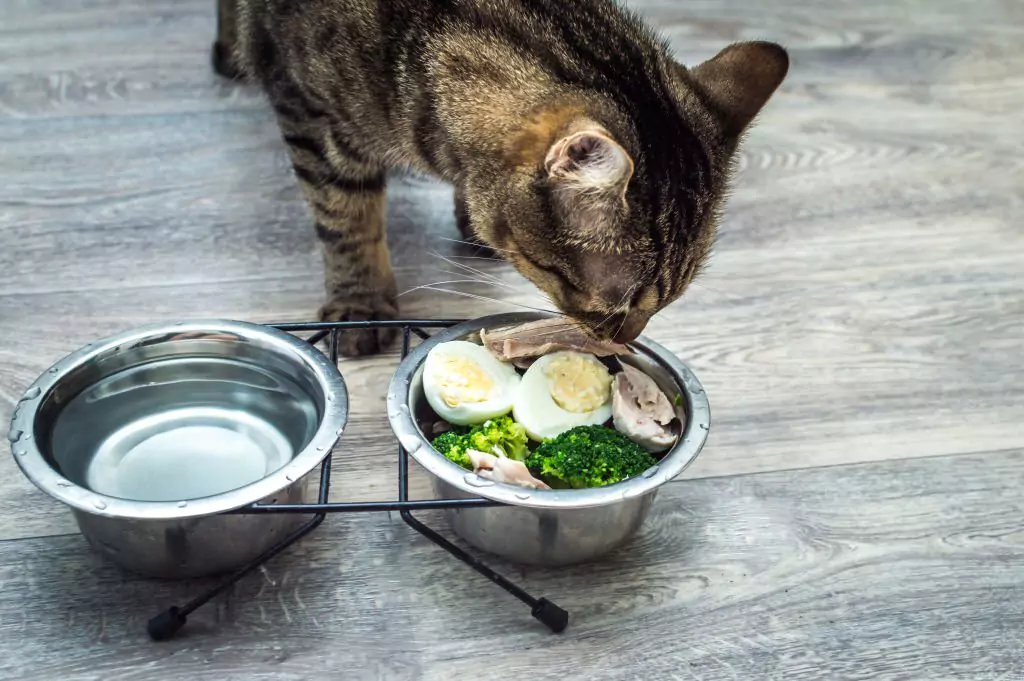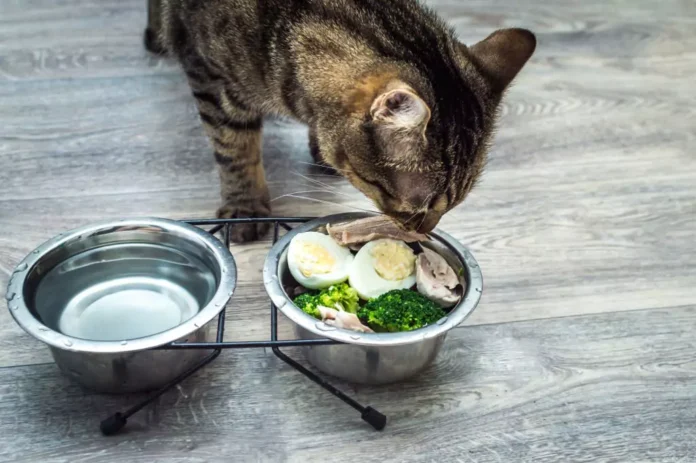Introduction: The Curiosity of Cat Owners
As cat owners, we are always curious about what our pets can and cannot eat. We want to ensure that they are getting the right nutrients and that their diet is balanced. One question that often comes up is whether cats can eat broccoli. Broccoli is a popular vegetable among humans, but can it be beneficial for our feline friends as well? In this article, we will explore the nutritional value of broccoli for cats, the potential health benefits, as well as the risks and precautions associated with feeding broccoli to cats.

Nutritional Value of Broccoli for Cats
Broccoli is a nutrient-dense vegetable that is packed with vitamins and minerals. It is low in calories and high in fiber, making it a great addition to a cat’s diet. Broccoli contains vitamins A, C, and K, as well as folate and potassium. These vitamins and minerals are essential for a cat’s overall health and well-being.
Vitamin A is important for maintaining healthy vision and a strong immune system. Vitamin C is an antioxidant that helps protect cells from damage and supports the immune system. Vitamin K is necessary for blood clotting and bone health. Folate is essential for cell growth and development, while potassium helps regulate blood pressure and maintain proper heart function.
Health Benefits of Broccoli for Cats
The health benefits of broccoli for cats are numerous. The vitamins and minerals found in broccoli can help improve a cat’s immune system, promote healthy digestion, and support overall health. The fiber in broccoli can aid in digestion and prevent constipation. It can also help regulate blood sugar levels and promote a healthy weight.
Broccoli also contains antioxidants, which can help reduce inflammation and protect against certain diseases. These antioxidants can help prevent cell damage and support a cat’s overall well-being. Additionally, the high water content in broccoli can help keep cats hydrated, especially if they are not drinking enough water.
Risks and Precautions of Feeding Broccoli to Cats
While broccoli can be beneficial for cats, there are some risks and precautions to consider. One potential issue is that cats may have difficulty digesting broccoli. Some cats may experience digestive upset, such as gas or diarrhea, when they eat broccoli. It is important to introduce broccoli gradually into your cat’s diet and monitor their reaction.
Another concern is that broccoli contains isothiocyanates, which can be toxic to cats in large quantities. However, the amount of isothiocyanates in broccoli is generally not enough to cause harm to cats. It is still important to feed broccoli in moderation and not as a primary source of food for your cat.
How to Introduce Broccoli to Your Cat’s Diet
If you decide to introduce broccoli to your cat’s diet, it is important to do so gradually. Start by offering small pieces of cooked broccoli as a treat or mixed in with their regular food. Monitor your cat’s reaction and look for any signs of digestive upset. If your cat tolerates the broccoli well, you can gradually increase the amount over time.
It is also important to remember that cats are obligate carnivores, which means that their diet should primarily consist of meat. Broccoli should not replace meat in their diet but can be offered as an occasional treat or supplement.
Alternatives to Broccoli for a Balanced Feline Diet
While broccoli can be a healthy addition to a cat’s diet, there are other vegetables and fruits that can also provide nutritional benefits. Some safe options include cooked carrots, green beans, and pumpkin. These vegetables are low in calories and high in fiber, vitamins, and minerals.
Fruits such as blueberries and apples can also be offered as treats in small quantities. However, it is important to avoid feeding cats grapes, raisins, onions, and garlic, as these can be toxic to them.
It is important to note that a balanced feline diet should primarily consist of high-quality commercial cat food that is specifically formulated to meet their nutritional needs. Vegetables and fruits should only be offered as occasional treats or supplements.
Signs of Allergic Reactions or Digestive Issues in Cats
When introducing any new food to your cat’s diet, it is important to monitor their reaction and look for any signs of allergic reactions or digestive issues. Signs of an allergic reaction may include itching, swelling, or difficulty breathing. Digestive issues may manifest as vomiting, diarrhea, or changes in appetite.
If your cat experiences any negative reactions to broccoli or any other food, it is best to consult with a veterinarian. They can provide guidance and determine if there are any underlying health issues that need to be addressed.
Conclusion: The Final Verdict on Cats and Broccoli
In conclusion, cats can eat broccoli in moderation and as part of a balanced diet. Broccoli is a nutrient-dense vegetable that can provide vitamins and minerals that are beneficial for cats. However, it is important to introduce broccoli gradually and monitor your cat’s reaction.
While broccoli can be a healthy addition to a cat’s diet, it should not replace meat as the primary source of food. Cats are obligate carnivores and require a diet that is high in animal protein. It is always best to consult with a veterinarian before introducing new foods to your cat’s diet to ensure that they are getting the right nutrients and that their diet is balanced.


